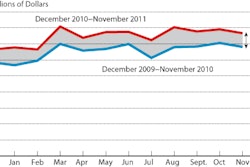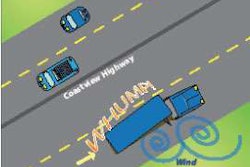The American Trucking Associations and the Coalition for Transportation Productivity on Tuesday, Jan. 31, both praised the U.S. House Committee on Transportation and Infrastructure and Chairman John Mica for their work to craft the American Energy and Infrastructure Jobs Act, a reauthorization bill the groups say also will modify federal transportation programs.
ATA said the surface transportation bill not only will make needed improvements to the nation’s highway system, but also will make that system safer for trucks and cars. “This bill is a major step forward, not just for trucking but for all users of our transportation system,” said Bill Graves, ATA president and chief executive officer. “From reforming how projects are delivered and refocusing the federal highway program on issues of national interest like freight movement, Chairman Mica has laid the groundwork for significant improvements in how Americans travel.”
Graves said ATA also is pleased that the bill includes a number of safety provisions, ranging from the creation of a drug and alcohol testing clearinghouse to stricter driver training requirements, and takes steps toward establishing crashworthiness standards for large trucks that ATA has championed. ATA also praised the legislation for addressing truck productivity and hours-of-service.
“We’re pleased that for the first time in 30 years, despite unfounded yet curiously well-funded attacks on the safety of our industry, the House appears set to make much-needed reforms to federal truck size and weight limits,” said Dan England, ATA chairman and chairman of Salt Lake City-based C.R. England Inc. “Allowing states to choose to open their interstate highways to more productive trucks is an important step to reducing costs to American consumers and reducing congestion on our highways.”
England said ATA also was thankful that the bill directs the Federal Motor Carrier Safety Administration to initiate a field study of its proposed hours-of-service changes, specifically the impacts of the proposed modifications to the 34-hour restart provision. “The researchers whose work was used to justify these changes said a field study was needed to understand the safety, cost and operational implications of such a change, and we agree wholeheartedly,” he said.
CTP, a group of 200 shippers and allied associations seeking increased federal vehicle weight limit on interstate highways, praised the truck weight reform proposal’s inclusion in the bill. The legislation would reform the federal vehicle weight limit by giving states the authority to permit larger single-trailer trucks on interstate highways within their borders.
The proposal would allow states to opt into a higher federal interstate vehicle weight limit for single-trailer trucks equipped with six axles rather than the typical five. The required sixth axle would maintain all braking and handling characteristics at the new limit of 97,000 pounds, enabling shippers to utilize truck space that remains empty at the current 80,000-pound federal weight limit. CTP said this proposal will reduce the truckloads, fuel and vehicle miles necessary to meet demand, and that participating states will have full authority to exclude these trucks from operating on any route or bridge.
“The American Energy and Infrastructure Jobs Act recognizes that states need the ability to create safer, greener, more efficient shipping on their interstate highways,” said John Runyan, CTP executive director. “Truck capacity has dropped by 16 percent since the recession started, and the 30-year-old federal vehicle weight limit compounds the problem by forcing many trucks to travel when they are only partially full. Now is the time to correct this inefficiency and help American shippers and manufacturers invest more funds in growth and job creation.”
Runyan said more than 90 percent of states already employ higher weight limits on state roads and bridges. Truck weight reform also would make American companies more competitive in the global marketplace, according to CTP; a recent study by the Organisation for Economic Co-Operation and Development compared truck productivity among developed nations and found that U.S. tractor semitrailers are the least productive due to highly restrictive vehicle weight limits.
“Current American truck weight regulations impose a significant competitive disadvantage in transport efficiency and results in significantly higher fuel use and emissions for a given freight task,” said John Woodrooffe, who helped author the OECD study and heads truck research at the University of Michigan Transportation Research Institute. “In North America alone, U.S. tractor semitrailer productivity trails Canada by 43 percent and Mexico by 52 percent in terms of cargo weight capacity. The proposed limit of 97,000 pounds represents a relatively modest increase that will help reduce the competitive gap our country is facing.”
The truck weight proposal contained in the American Energy and Infrastructure Jobs Act is based on federal legislation known as the Safe and Efficient Transportation Act (SETA). The bill first was introduced in the U.S. House of Representatives by Reps. Michael Michaud (D-Maine) and Jean Schmidt (R-Ohio) as H.R. 763. Identical companion legislation, S. 747, was introduced in the U.S. Senate by Sens. Mike Crapo (R-Idaho), Herb Kohl (D-Wis.), Susan Collins (R-Maine) and Rob Portman (R-Ohio).












